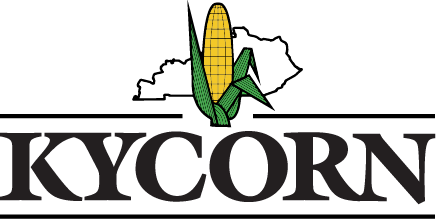KY Corn partnered with the U.S. Grains Council (USGC) to host buyers from Japanese starch milling companies who were interested in understanding American farmers’ efforts to decarbonize the corn they import. Our goal was to connect the values of Kentucky farmers and partnerships with end-users of Kentucky grown corn with their expectations to build and retain strong demand for grain commodities grown here in the USA.

The delegation began at Lester Family Farms in Cadiz, KY, where Micah Lester presented practices they use on the farm, strip till and no-till, controlled traffic, cover crops, and keeping living roots in the soil. With corn already tasseling, and cover crop residue still visible between the rows in some places, Micah’s message was proven true, and a perfect example of sustainability in action.
Traveling from there to visit with Brandon Hunt in Herndon, KY, they experienced the hectic moments of wheat harvest and planting double-crop soybeans. Visitors saw the entire process unfold, from the combine to the grain cart to soybean planting – and understood the importance of that all happening within hours. Brandon and others explained how high yielding wheat serves soil tilth with living roots throughout the year – accomplishing the same objectives as cover crops, and the group saw how sustainability fits into real-world farm decisions.
It was also important for the visitors to understand the strength of farmer relationships with NRCS and other state and federal service providers. So, while in Hopkinsville the visitors spent time with USDA officials to explain conservation compliance and measures to restrict land-use change within our governmental structure and regulatory system. Brian Hacker from NRCS provided an overview of audit measures and penalties in cases of non-compliance.

The group then moved to Peterson Farms in Loretto, where Scott Ebelhar, Bernard Peterson, and Grant Ziliak shared how they grow corn to meet the specific needs of end users in the distilling industry. They highlighted the close collaboration with Maker’s Mark and Heaven Hill, telling how specific farm-corporate partnerships help end-users source ingredients that align with rising consumer expectations.
The visitors challenged us to convince them that our sustainability claims on the corn they import from us are legitimate – and why our corn provides those features better than our competitors do. Throughout the visit, the guests heard directly from experts and program leaders working to ensure successful and documented sustainability benchmark improvements. Thanks to Farm Bureau staff, University of Kentucky faculty and Precision Conservation Management technicians who stayed with us on the entire visit to reinforce these points and demonstrate how American farmers have the resources at their disposal to back up our assertions about how the corn is grown. As consumer expectations shift toward sourcing sustainably produced grain, our farmers proved to the delegation that American corn stands ready meet the task in an honest and true fashion.
The backbone of our sustainability claims is USGC’s Corn Sustainability Assurance Protocol (CSAP), managed by Carlos Suarez, USGC’s Global Director of Sustainability. This tool documents the features of our production decisions and verify practices to assure international buyers. Global buyers who demand these features expect proof and transparency. Carlos presented the methodology of the CSAP in detail to our guests.
The tour concluded at Double R Farms in Adairville, where Brandon and Lauren Robey embodied the future of sustainable agriculture as a young, first-generation farm family. The on-farm infrastructure investment of this young couple showed how American agriculture will be an energetic and reliable provider for the world. Also on this farm, the full package of how our crop rotation benefits soil health was clearly demonstrated to the Japanese delegation.

As many trading terms and trade agreements are renegotiated, corn exporters across the world are taking advantage of a narrative that the United States cannot be a trusted trading partner. We remain in a fight for every bushel of corn export demand. The US Grains Council, who receives substantial corn checkoff investment from Kentucky, is the corn industry’s advocate in those markets, which are currently quite delicate.
USGC places staff in dozens of overseas offices to keep the connections strong. Expect them to continue bringing curious buyers into our back yard to reassure and respond to concerns. Expect volunteer leaders from your commodity groups to meet the task by pulling the curtain back on how we are still the best choice for ag product importers.

